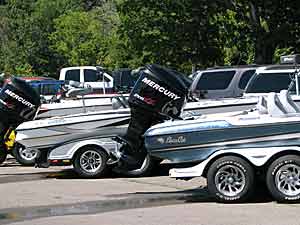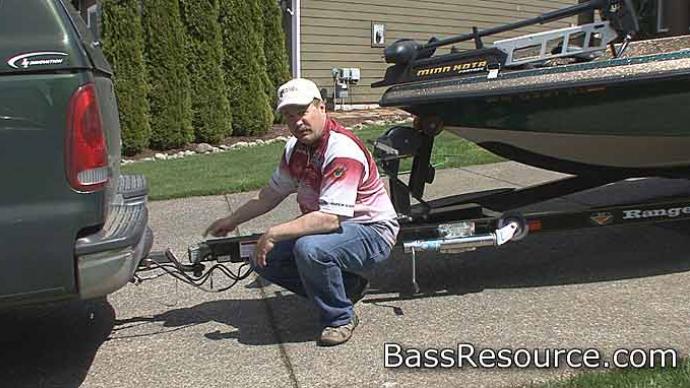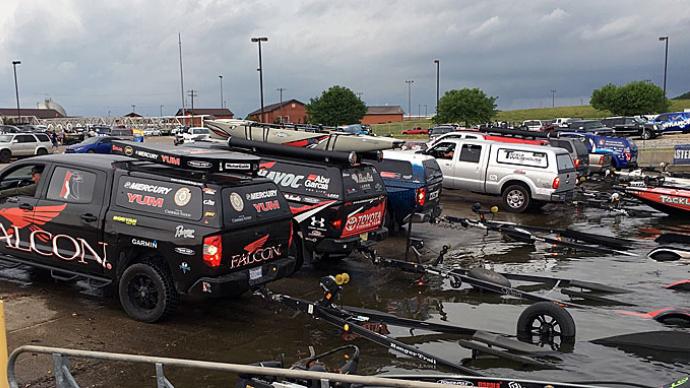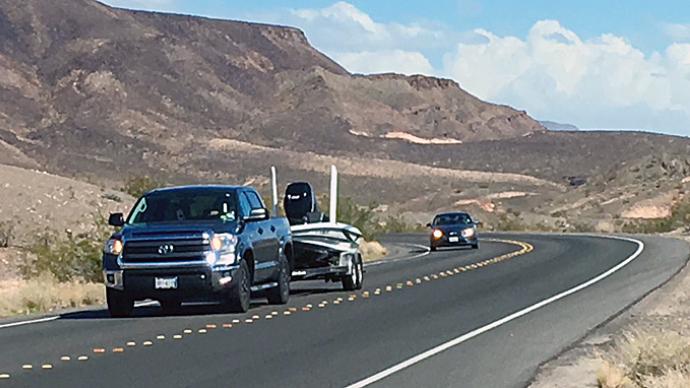-
Practice Trailer Backing
Image
Backing a trailer into tight places or down a launch ramp is easier than it looks, but it does take some practice. It's best to practice in a parking lot and a vehicle that allows you to see the trailer through the rear window. Vans, trucks, and campers that have obstructed rear views require more practice and the use of side mirrors. In either case, be patient, and make steering adjustments slowly and a little at a time.
Tip: The easiest way to remember which way the trailer turns when you turn your steering wheel is to place your hand on the BOTTOM of the steering wheel. Now, wherever you want the trailer to go, you can move your hand in that direction.
-
Watch Your Tongue Weight
How a trailer handles down the road depends upon tongue weight. Too much tongue weight will cause the rear of the trailer to sway and make the tow vehicle challenging to control. The tongue weight should be at most 200 pounds for trailers up to 2,000 pounds. Tongue weight for trailers over 2,000 pounds should be 10 to 15 percent of the trailer's loaded weight.
-
Take Care of Tires
Fishermen tend to worry about their boats and neglect their trailer tires. That's a mistake because if the trailer breaks down, it can ruin a fishing trip or, worse, a week's vacation. It's wise to periodically check tires for wear, cuts, or other damage and replace them as needed. Above all, maintain the tire pressure recommended by the manufacturer, located on the tire sidewall. Improperly inflated tires will cause them to wear out quicker and reduces fuel mileage.
-
Keep Bearings Greased
Wheel bearings are the heart of trailers. They need to remain airtight and packed with fresh grease. Poorly greased bearings will overheat and deteriorate, creating severe problems if they fail. They should be inspected and repacked at least once a year, depending upon the amount of use. Lay your hand on your wheel hubs after traveling. If they feel hot, you may have a problem. But why wait? Routine maintenance is good prevention.
-
Go Wide on Turns
Be careful making sharp turns or sudden moves when trailering a boat. The trailer tends to cut corners more sharply than the tow vehicle, which can be dangerous when cutting corners close to curbs, other vehicles, and roadside obstructions. Striking solid objects at an angle can cause tire damage and cause you to lose control momentarily.
-
Be A Weight Watcher
When loading the boat with gear before trailering to the lake, balance the rig with 60 percent of the cargo weight near the front. Don't fill boat gas tanks for long trips until you get close to the lake. Gasoline adds several pounds and will affect the fuel mileage of your tow vehicle.
-
Secure the Trailer
Keep the safety chains on most boat trailers fastened securely to the tow vehicle in case the hitch fails. Cross the chains under the trailer tongue and allow slack for turning. For additional security, padlock the trailer hitch to the tow vehicle. That will also prevent someone from stealing the trailer while you're out fishing.
-
Keep the Lights Working
The trailer's electrical components are subjected to many adverse conditions, so check them periodically. Ask a fishing buddy to step behind the boat to ensure rail lights, brake lights, and turn signals are working correctly. If signals are dim, perhaps there is a bad connection, or you need a more powerful flasher unit on the tow vehicle. An occasional shot of WD-40 into the pigtail wiring connector will reduce corrosion.
-
Ensure Your Vehicle Has Towing Power
Just because a vehicle has the power to pull a loaded boat trailer down the road doesn't mean it has the guts to haul it up steep reservoir launching ramps or that the brakes are capable of holding it on a steep incline. Follow manufacturers' towing guidelines and never exceed tow limits. Too much trailer weight can cause an accident or pull the tow vehicle into the lake on a steep ramp.
-
Loading Should Be Easy
If it takes more than a few minutes to get your boat on the trailer, the bunks and rollers must be appropriately set, or you're submerging the trailer too far in the water. Submerge about one-third of the bunks on the trailer, then drive the boat to the winch roller. Secure the boat with the winch hook before pulling the boat to the top of the ramp.
https://dev.bassresource.com/fishing/trailer.html
Bass Boats & Boating Care
By
/ March 14, 1998




